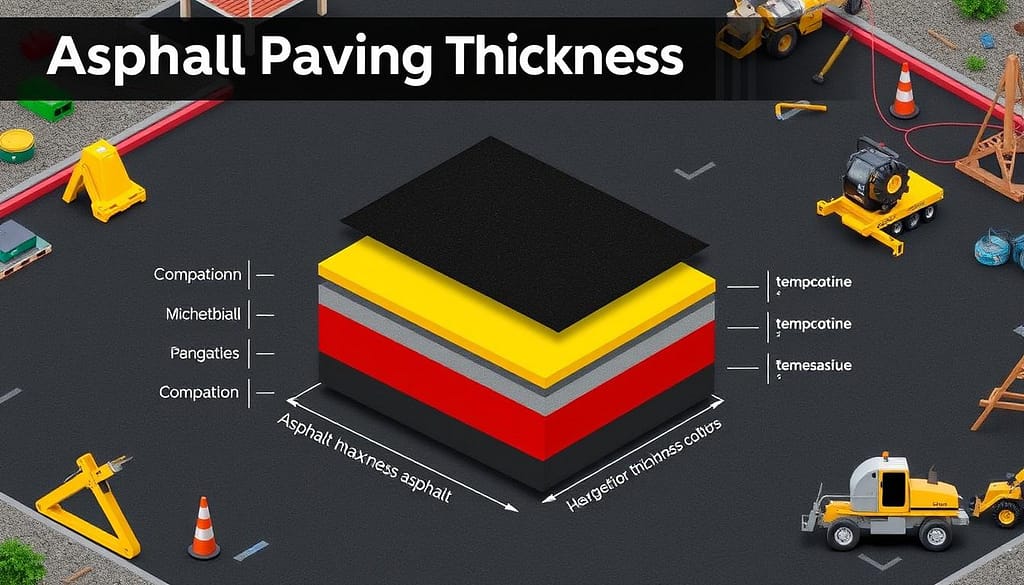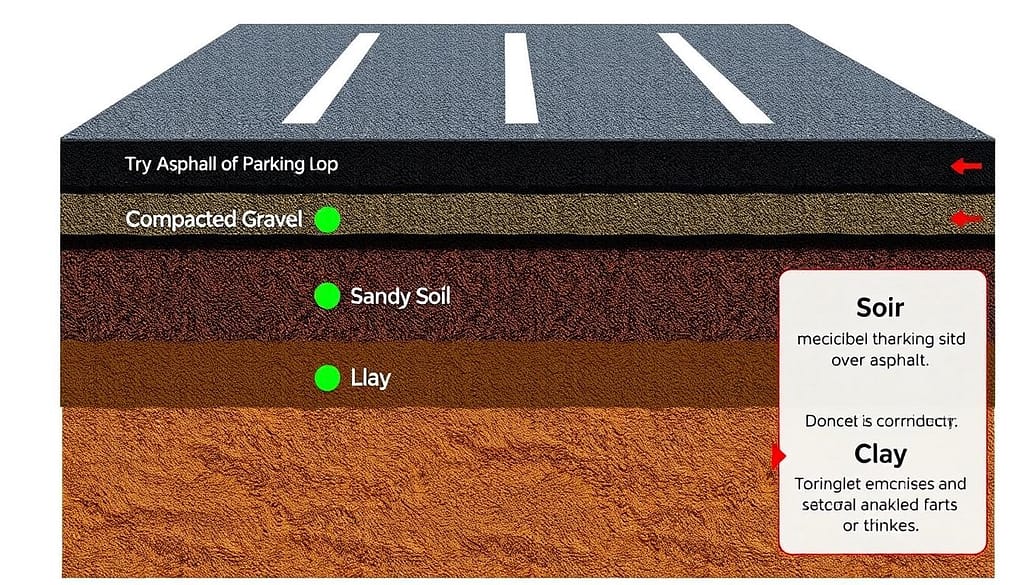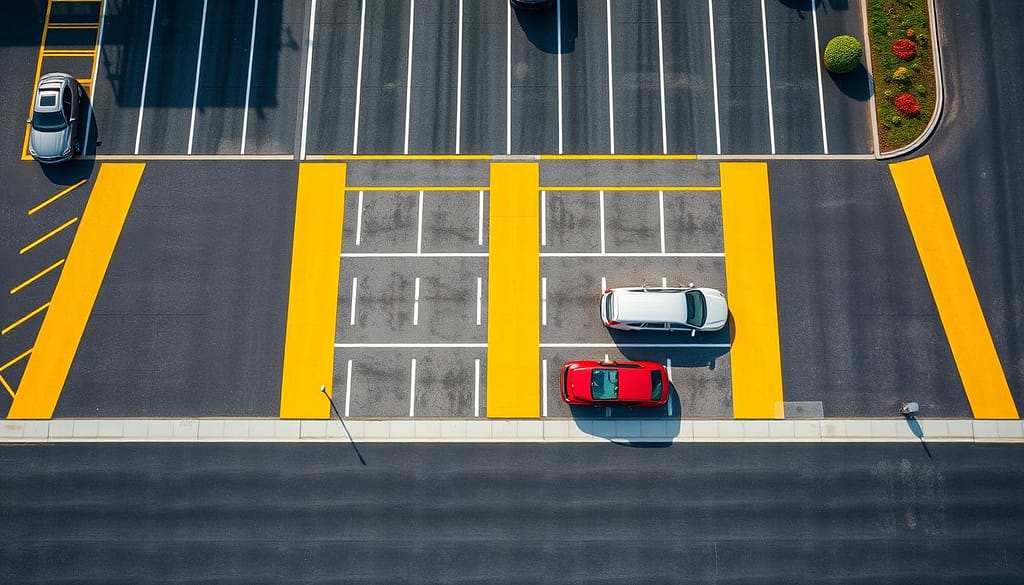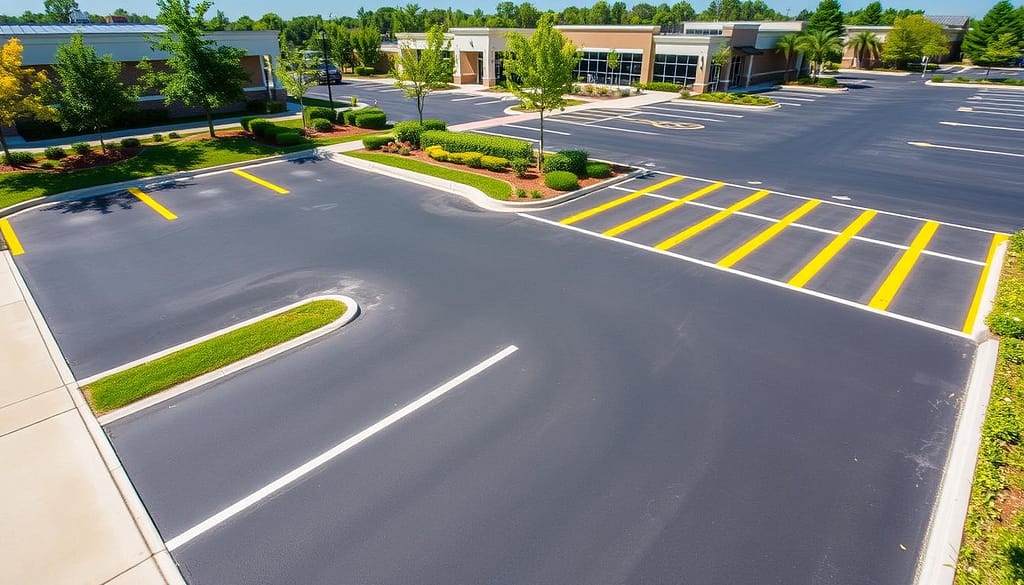When thinking about asphalt parking lot thickness, I often ask: what’s the best thickness for durability and safety? The right thickness can greatly affect a parking lot’s lifespan and upkeep costs. Different factors, like traffic and soil, play a big role in determining the perfect thickness. In this article, I’ll explore the key elements that affect asphalt parking lot thickness.
I’ll look at standard measurements, like an 8.0-inch base layer and 1.5 to 2.0 inches of asphalt on top. This guide will help you pick the right thickness for your parking lot. Whether it’s for light or heavy use, knowing what affects thickness is key for a safe and lasting parking lot. I’ll cover the important aspects of asphalt thickness, including the structure and standard measurements, to help you make smart choices for your parking lot.
Understanding Asphalt Parking Lot Thickness Basics
Asphalt thickness is key to a parking lot’s durability and life span. The subgrade, base course, and surface course all add to the pavement’s thickness and stability. Asphalt thickness standards change based on the parking lot’s use, with more traffic needing thicker pavements.
Building a parking lot right means focusing on drainage to avoid water buildup. The asphalt thickness standards depend on the traffic and soil. For example, lots with lots of cars need thicker pavement to handle the weight.
When building a parking lot, consider the minimum pavement thickness. It can be 2 to 4 inches or more, based on traffic and soil. Also, good drainage is vital to keep the pavement lasting longer.
Factors That Determine Required Thickness
Several factors influence the thickness needed for an asphalt parking lot. The asphalt paving thickness chart is key in this process. It shows the minimum thickness needed for different parking lots. For example, the minimum asphalt thickness for parking lots changes based on traffic and soil.
The type of traffic is a major factor. Residential driveways need at least 2″ of asphalt, while commercial lots need 3″. Here are some general thickness guidelines:
- Residential driveways: 2-3″ of compacted asphalt
- Commercial parking lots: 3-4″ of compacted asphalt
- Heavy-duty applications: 4-6″ of compacted asphalt
Soil conditions and climate also matter. Different areas need different asphalt thicknesses. Not meeting these needs can cause the asphalt to deteriorate early.
Aggregate type and compaction method also affect thickness. By considering these factors and using an asphalt paving thickness chart, you can find the best thickness for your lot. This ensures it lasts for many years.
Soil Conditions and Their Impact on Asphalt Requirements
Soil conditions are key when it comes to parking lot paving requirements. The type of soil and how well it drains can affect the asphalt’s performance and lifespan. Good drainage in the soil can change the asphalt thickness needed for a project.
It’s important to know the soil well to prepare it for the asphalt. This means using soil testing methods to find out what the soil is like. Then, subgrade preparation techniques can be used to make the surface stable and even.
Good drainage considerations are also important to avoid water damage to the asphalt. A proper drainage system and compacted soil can help. This way, the right asphalt thickness standards can be set for a durable parking lot paving job.
The table below shows the recommended asphalt thickness standards for different projects:
| Project Type | Recommended Asphalt Thickness |
|---|---|
| Residential Driveways | 2-3 inches |
| Commercial Parking Lots | 3-4 inches |
| Industrial Parking Lots | 5-7 inches |
By looking at the soil and parking lot paving requirements, the best asphalt thickness standards can be found. This ensures a lasting solution for any project.
Traffic Load Requirements and Vehicle Types
When figuring out the recommended asphalt depth for parking lots, it’s key to think about the traffic and vehicle types. The weight and how often vehicles like trucks and cars use the lot matter. For example, a lot for heavy trucks needs thicker asphalt than one for cars.
The kind of vehicles using the lot affects the asphalt parking lot thickness. Here are some general tips:
- Residential driveways with light traffic (passenger cars): 2-3 inches of compacted hot-mix asphalt (HMA)
- Residential driveways that may support heavier vehicles (RVs or delivery trucks): 3-4 inches
- Commercial parking lots with light traffic: 3 inches
- Commercial parking lots with heavy traffic: 4-6 inches
Remember, asphalt parking lot thickness isn’t the same for everyone. The right thickness depends on the subgrade, climate, and use of the lot. By considering these and choosing the right recommended asphalt depth for parking lots, you can get a durable and lasting parking lot.
Regular upkeep and quick repairs can also make your asphalt lot last longer. Knowing about traffic and vehicle types helps you decide on the asphalt parking lot thickness. This way, you can have a safe and durable parking lot for years.
Climate and Weather Considerations for Asphalt Thickness
Asphalt thickness is key to a parking lot’s life span. It’s not the same everywhere because of different weather. Places with really hot or cold temperatures need thicker asphalt to last longer.
Guidelines for building parking lots suggest different thicknesses based on the weather:
- 2 to 3 inches for light vehicles and low-traffic volumes in mild climates
- 3 to 4 inches for parking lots with higher traffic volumes and mixed vehicle types in moderate climates
- 4 to 6 inches or more for areas with extreme temperatures, heavy traffic, or frequent freeze-thaw cycles
Every region has its own needs. For example, California suggests 3 to 4 inches, while Texas needs 4 to 6 inches. In New York, 4 to 6 inches is recommended, with busier areas needing 6 inches. These differences show why local weather matters when choosing asphalt thickness.
| State | Recommended Asphalt Thickness |
|---|---|
| California | 3 to 4 inches |
| Texas | 4 to 6 inches |
| New York | 4 to 6 inches |
| Alaska | 6 to 8 inches |
By thinking about the weather and following guidelines, you can make sure your asphalt parking lot is strong, safe, and meets the right standards.
Standard Asphalt Parking Lot Thickness Specifications
Choosing the right thickness for an asphalt parking lot involves several factors. The asphalt paving thickness chart is a good starting point. But, it’s key to think about your parking lot’s specific needs. For example, the minimum asphalt thickness for parking lots changes based on traffic and use.
For light traffic, a 6-inch aggregate base, a 2.5-inch asphalt base, and a 1.5-inch asphalt surface are common. Heavy traffic needs more, with a 6-inch aggregate base, two 2.5-inch asphalt bases, and a 1.5-inch surface. Here’s a quick look at the minimum thickness for different traffic types:
| Traffic Type | Aggregate Layer | Asphalt Base Layer | Asphalt Surface Layer |
|---|---|---|---|
| Light Duty | 6 inches | 2.5 inches | 1.5 inches |
| Moderate Duty | 6 inches | 2 x 2.5 inches | 1.5 inches |
| Heavy Duty | 6 inches | 2 x 2.5 inches | 1.5 inches |
Remember, these are general guidelines. Your parking lot’s specific conditions might require different thicknesses. Talking to a professional can help make sure your asphalt parking lot is built right and lasts long.
Installation Methods and Best Practices
Installing asphalt parking lots right is key for their performance and life span. The second source stresses the importance of proper installation. A solid sub-base is needed to handle heavy vehicles and harsh weather. It must be well-compacted for stability.
Drainage is a big deal, as bad drainage can cause damage like heaving and potholes. The sub-base and binder need time to cure, usually 24-48 hours. Here are some tips to keep in mind:
- Do a proof roll to check the sub-base and fix soft spots.
- Use undercutting or geo-grid to replace soft soil with solid material.
- Apply each new layer of asphalt to make it smoother, with the first layer making it about 75% smooth.
Asphalt thickness matters, with a minimum of four times the NMAS of the aggregate for dense-graded mixtures. Proper compaction is also key, with each 1% increase in density adding 10% to the pavement’s life. By following these tips, asphalt pavement can last up to 25 years with regular care.
For more details on installation and best practices, talk to experienced pros. Following established guidelines is vital for a successful and lasting asphalt parking lot installation.
Common Thickness-Related Problems and Solutions
Asphalt parking lot thickness is key to its long life and performance. If it’s too thin, you might see cracks and other issues. These problems can make maintenance more expensive and less safe.
Potholes, raveling, and edge cracking are common problems. Potholes can get bigger and cost a lot to fix. Raveling makes the pavement thinner over time. Edge cracking happens when drainage is poor or edges aren’t strong enough.
To fix these problems, it’s important to use the right amount of asphalt. Here are some ways to solve common issues:
- Regular maintenance: Keep an eye on your parking lot to catch problems early.
- Proper installation: Make sure the asphalt is put down right to avoid issues.
- Repair methods: Use techniques like infrared patching to fix potholes and other problems.
Understanding asphalt thickness and fixing common problems helps keep parking lots in good shape.
| Problem | Cause | Solution |
|---|---|---|
| Potholes | Inadequate maintenance, poor drainage | Infrared asphalt patching, spray patching |
| Raveling | Inadequate maintenance, poor installation | Regular inspections, repair methods |
| Edge cracking | Poor drainage, lack of support | Properly designed edges, regular maintenance |
Conclusion: Ensuring Long-Term Parking Lot Performance
The right thickness of an asphalt parking lot is key to its lasting performance. Many factors, like soil, traffic, and weather, affect the needed thickness. Following industry standards helps keep your parking lot safe and durable for everyone.
For the best outcome, talk to seasoned paving experts or engineers. They can guide you based on your specific situation. Remember, regular upkeep like sealcoating and quick repairs also play a big role. This way, you can avoid costly repairs later and ensure a great parking experience for your visitors.






